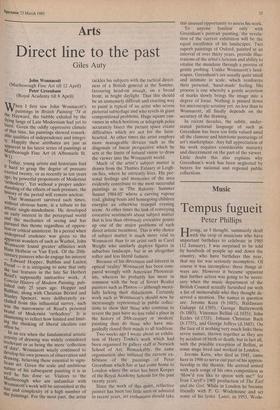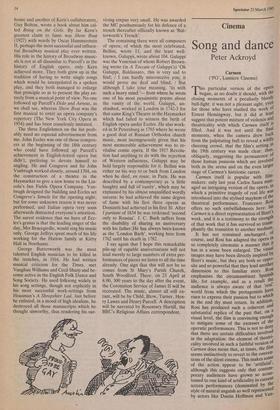M usic
Tempus fugueit
Peter Phillips
Having, as I thought, summarily dealt with the crop of musicians who have important birthdays to celebrate in 1985 (12 January), I was surprised to be told by hundreds of people up and down the country, who have birthdays this year, that my list was seriously incomplete. Of course it was incomplete: these things al- ways are. However it became apparent that further action was going to be neces- sary when the music department of the British Council actually furnished me with a list of memorabilii who they thought de- served a mention. The names in question are: Jerome Kern (b.1885), Baldassare Galuppi (d.1785), George Butterworth (b.1885), Vincenzo Bellini (d.1835), John Eccles (d.1735), Johann Christian Bach (b.1735), and George Jeffrys (d..1685). On the face of it nothing very much links these seven names, thrown together as they are by accident of birth or death; but in fact all, with the possible exception of Bellini, at some stage lived and worked in London.
Jerome Kern, who died in 1945, came here in 1906 to serve out part of his appren- ticeship in the theatre. He arrived armed with such songs of his own composition as `How'd you like to spoon with me?' for Ivan Caryll's 1905 production of The Earl and the Girl. While in London he became friendly with P. G. Wodehouse and set some of his lyrics. Later, in 1953, Wode- house and another of Kern's collaborators, Guy Bolton, wrote a book about him cal- led Bring on the Girls. By far Kern's greatest claim to fame was Show Boat (1927) with words by Oscar Hammerstein II, perhaps the most successful and influen- tial Broadway musical play ever written. His role in the history of Broadway music- als is not at all dissimilar to Purcell's in the history of English opera; only Kern achieved more. They both grew up in the tradition of having to write single songs which would be interpolated in a spoken play, and they both managed to enlarge that principle so as to present the play en- tirely from a musical point of view. No one followed up Purcell's Dido and Aeneas, as we shall see, whereas Show Boat was the first musical to enter an opera company's repertory (The New York City Opera in 1954) and has been ceaselessly imitated.
The three Englishmen on the list prob- ably need no especial advertisement from me. John Eccles was one of those compos- ers at the beginning of the 18th century who could have followed up Purcell's achievement in English-texted opera but didn't, prefering to devote himself to angling. He and Congreve and Sir John Vanbrugh worked closely, around 1704, on the construction of a theatre in the Haymarket to give a new home to the Lin- coln's Inn Fields Opera Company. Van- brugh designed the building and Eccles set Congreve's Semele for the opening• night; but for some unknown reason it was never performed, and Italian opera very soon afterwards distracted everyone's attention. The surest evidence that we have of Ecc- les's genius is that the leading singer of the day, Mrs Bracegirdle, would sing his music only. George Jeffrys spent much of his life working for the Hatton family at Kirby Hall in Northants.
George Butterworth was the most talented English musician to be killed in the trenches, in 1916. He had written musical criticism for the Times, met Vaughan Williams and Cecil Sharp and be- come active in the English Folk Dance and Song Society. He used folksong widely in his song settings, though not explicitly in his most successful work-settings from Housman's A Shropshire Lad. Just before he enlisted, in a mood of high idealism, he destroyed all those manuscripts which he thought unworthy, thus rendering his sur- viving corpus very small. He was awarded the MC posthumously for his defence of a trench thereafter officially known as 'But- terworth's Trench'.
The remaining three were all composers of opera; of which the most celebrated, Bellini, wrote 11, and the least well- known, Galuppi, wrote about 104. Galuppi was the Venetian of whom Robert Brown- ing wrote (in A Toccata of Galuppi's) 'Oh Galuppi, Baldassaro, this is very sad to find; / I can hardly misconceive you; it would prove me deaf and blind; / But although I take your meaning, 'tis with such a heavy mind:'— from where he wrote one of his most, pessimistic poems about the vanity of the world. Galuppi, un- abashed, worked in London in 1742-3 for that same King's Theatre in the Haymarket Which had failed to witness the birth of English opera under Eccles. He also work- ed in St Petersburg in 1765 where he wrote a good deal of Russian Orthodox church music, most incongruously given that his most memorable achievement was to re- vitalise comic opera. If the 1917 Revolu- tion had anything to do with the rejection of Western influences, Galuppi may be held largely responsible for it. Bellini was either on his way to or back from London when he died, en route, in Paris. He was described by a contemporary as 'a little haughty and full of vanity', which may be explained by his almost unqualified wordly success: he had achieved the same degree of fame with his first three operas as Donizetti had achieved in his first 30. After I puritani of 1834 he was reckoned 'second only to Rossini'. J. C. Bach suffers from the disability of sharing an anniversary with his father1He has always been known as the 'London Bach', working here from 1762 until his death in 1782.
I say again that I hope this remarkable pile-up of capable anniversarians will not lead merely to large numbers of extra per- formances of pieces we' listen to all the time already. One sign that this will not be so comes from St Mary's Parish Church, South Woodford. There, on 23 April at 8.00, 300 years to the day after the event, the Coronation Service of James II will be recreated. The music, almost all still ex- tant, will be by Child, Blow, Turner, Hen- ry Lawes and Henry Purcell. A description will be narrated by Rosemary Hartill, the BBC's Religious Affairs correspondent.















































 Previous page
Previous page